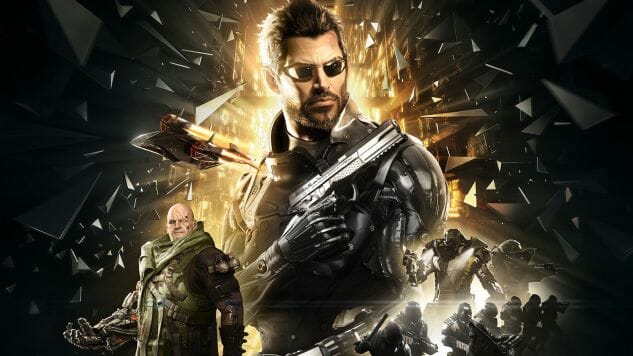Deus Ex: Mankind Divided Doesn’t Examine the Real World Issues it Brings Up

Deus Ex has rarely shied away from controversy. The original 2000 game was a milestone for many, and spoke in a manner that still resonates today. It foresaw the rise of the Patriot Act, the growth of constitutional liberalism and the repercussions of a state turned to paranoia.
Deus Ex: Mankind Divided is the serialization of these concepts, a game willing to evoke contention without a desire to act on it. The whole of Mankind Divided is a truncated version of the series, an entertaining romp instead of an introspective experience.
Throughout my time with Deus Ex: Mankind Divided, I couldn’t help but think back on Patrick Lindsey’s statement that sequels should be interpretive rather than mimetic endeavors. In so many ways, Mankind Divided seeks to fill the quota of Deus Ex proper. The game opens in medias res, with stoic protagonist Adam Jensen about to drop into a high-tension mission in a foreign land. He’s a lone operative, a specialist called on for the most sensitive tasks, able to cut through the bureaucracy and get results.
Of course, the mission goes awry. A mysterious third party gets involved, and a conspiracy is born. A visual cut to a group of men in a room, plotting a course for the world and acting as the invisible hand that shifts Atlas’ posture beneath the Earth when it so chooses. This is one focal point: the men who lurk in shadows, who pull the strings, the Real Evil of this world.
The other focal point is the tension between the Augmented and “naturals.” After the events of Human Revolution, now referred to as The Incident, the world progressed rapidly towards segregation and xenophobia. Most of your time in Mankind Divided will be set in Prague, the first city to implement “anti-Aug” legislation. Trains are segregated, citizens harassed, housing limited. Just outside Prague is Golem City, a clever name for a ghetto built to contain certain Augs—those disruptive, unbending, or simply passing by the wrong officer on the wrong day.
If the game’s marketing using terms like “Augs Lives Matter” made you wary, those concerns won’t be quieted by the game itself. There’s a tepid balance of introspection and ignorance that Mankind Divided teeters on. In some moments, it shines clearly, through a passionate speech from an NPC or the increasing militarization of the police force throughout the length of the game. In others, it stumbles and contradicts itself. It’s possible using “Augs Lives Matters” in the promotional artwork was coincidental, but when posters emblazoned with “All Human Lives Matter” populate a city and TV spokespeople espouse the hypocrisy of “social justice warriors” on in-game broadcasts, it’s harder to feign ignorance.
The Adam Jensen of Mankind Divided is weary, and I don’t blame him. It speaks loudly when common phrases of the day are used in this world. There’s no cultural context for these idioms in Deus Ex, no greater truth wrought by implementing them. The game gains nothing but attention by stoking the fire, and then moves along. Jensen is tired of seeing the same touch-and-go attitude; he wants to start thinking about real change, but the game seems disinterested in spending too much time on these thoughts. The segregation and Augmented tension ultimately serves as a catalyst for action and the plans of the Illuminati, a reason for the player to get involved in covert operations and little else.
Any solace for storytelling comes in the side missions, often laid just slightly off the path of the main quest and fleshing out an otherwise empty hub-world. Prague is beautiful, but it’s small and constrictive. Unlike previous Deus Ex titles, your only haunt is Prague, with occasional flights out and back from one-off mission areas. The city is filled with interesting characters, from the core cast to matriarchs and jaded pilots, but the only time you spend with them is in specific side missions that offer extra rewards. These little deviations from the critical path don’t just offer distraction, but some of the best parts of the game.
A murder mystery that started about midway through the game managed to captivate my interest the most. Investigating blood stains and evidence, I was given a chance to assist in finding a serial killer that many had thought dead for years. Rather than using guns or tech, it was an intellectual puzzle—intuition and charisma were the best tools for the job. I had to interview suspects and examine evidence, rather than hack or shoot my way through. It took turns, developed a full arc, even touched on mental health issues in a way that resonated with me.
These moments are memorable due to the rote nature of the game proper. The blueprint is still the same for Mankind Divided; stealth and platforming are the standard, unless you enjoy turning a pretty solid stealth game into a barebones cover-shooter by going loud. New augmentations are found within Jensen’s circuits, an anomaly that practically screams Game Design Choice. Although options like Remote Hacking and Tesla charges seem appealing, there are precious few opportunities to choose them over the same upgrades you probably used in Human Revolution. Despite my attempt to access and utilize these new powers, I still fell back on maxing out my hacking, social skills and cloaking, the most reliable and efficient tools for the job.
-

-

-

-

-

-

-

-

-

-

-

-

-

-

-

-

-

-

-

-

-

-

-

-

-

-

-

-

-

-

-

-

-

-

-

-

-

-

-

-










































